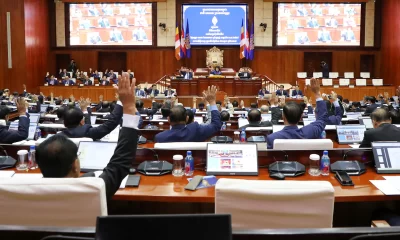Business
Air Peace sues NLC, TUC for disrupting flight operations
Air Peace Ltd, a private Nigerian airline, has filed a lawsuit against the Nigeria Labour Congress (NLC) and Trade Union Congress of Nigeria (TUC) at the Federal High Court in Lagos. The airline alleges that its operations were disrupted by the unions and their officers.
Air Peace is seeking ₦1 billion as general damages, ₦450 million as special damages, and ₦250 million as exemplary damages from the defendants. The lawsuit has been brought before the court based on the relevant provisions of the 1999 Constitution, the Federal High Court (Civil Procedure) Rules, 2019, and the court’s inherent jurisdiction; Channels TV reports.
The defendants named in the suit include the President of NLC, Joe Ajaero; the President of TUC, Festus Osifoh; the Secretary-General of NLC, Comrade Emmanuel Ugboaja; and the General Secretary of TUC, Comrade Nuhu Toro.
Background
Air Peace is requesting the court to declare that the defendants’ deliberate actions to ground all the plaintiff’s flights throughout Nigeria, based on the fact that Air Peace is responsible for the majority of air-passenger and goods flights in the country, constitute sabotage of the national economy and security.
The airline argues that such actions have a significant impact, considering the sensitive nature of aviation and the current climate of insecurity in long-distance travels within Nigeria. Additionally, the plaintiffs are seeking an order of perpetual injunction to restrain the defendants from repeating or continuing acts of intimidation and coercion against Air Peace.
According to documents submitted to the court, Air Peace alleges that on May 3, 2023, its employees were confronted by a noisy mob belonging to NLC and TUC at the Murtala Mohammed Airport and the Murtala Mohammed Airport Terminal 1 premises in Lagos. The mob disrupted the airline’s work, causing damage to property, injuring employees, and engaging in altercations with customers and staff.
The airline further claims that the defendants’ actions had a ripple effect on its operations in other airports across the country, leading to the cancellation of scheduled flights at airports such as Nnamdi Azikiwe Airport in Abuja and Sam Mbakwe Airport in Owerri.
Air Peace alleges that the defendants’ motive behind the disruption was to punish Governor Hope Uzodimma of Imo State, and this led to the total shutdown of Imo State from May 3, 2023, as stated in the defendants’ joint communiqué of May 1, 2023.
The airline states that its employees suffered physical harm and psychological trauma due to the disruption, resulting in hospital visits and absenteeism from work. In addition to financial losses, Air Peace claims that its business reputation has been significantly damaged in the eyes of its customers, the general public, and investors.
The airline’s lawyers previously sent letters to the defendants on May 12, 2023, demanding compensation for the injuries caused, but the defendants have allegedly disregarded the demands and instead threatened further disturbance to Air Peace’s operations.
Air Peace argues that the defendants’ conduct, which resulted in significant losses, is malicious and deserving of reproach. Hence, the airline seeks the award of general, special, and exemplary damages totaling ₦1.7 billion.























